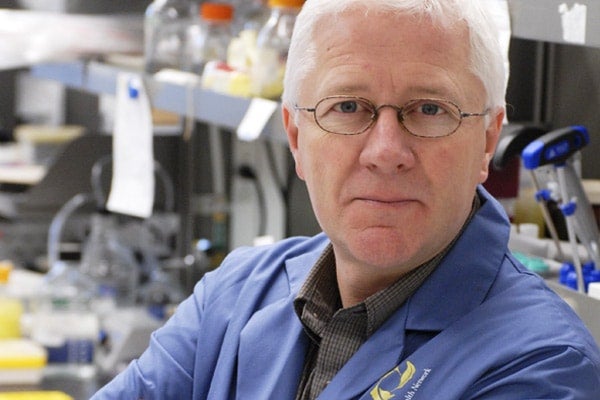
A "paradigm shift" for cancer research
Published: December 14, 2012
Scientists at the University of Toronto have discovered that genetic mutations – regarded by many as the chief cause of cancer growth – are only one piece of the puzzle.
Biological factors and cell behaviour also drive tumour growth, contributing to therapy failure and relapse, said Professor John Dick of the Department of Molecular Genetics and Canada Research Chair in Stem Cell Biology.
The finding, published Dec.13, 2012 in Science, is “a major conceptual advance in understanding tumour growth and treatment response,” Dick said.
By tracking individual tumour cells of colorectal cancer, Dick’s team of researchers found that not all cancer cells are equal: only some cancer cells are responsible for keeping the cancer growing. Researchers also discovered a class of cancer cells that could lie dormant before being activated.
When chemotherapy was given to mice in which the human tumours were growing, the team made the unexpected finding that the long-term cancer cells were generally sensitive to treatment. However, the dormant cells were not killed by drug treatment and became activated, causing the tumour to grow again.
The cancer cells that survived therapy had the same mutations as the sensitive cancer cells proving that cellular factors not linked to genetic mutation can be responsible for therapy failure.
“The data show that gene sequencing of tumours to find the spectrum of their mutations is definitely not the whole story when it comes to determining which therapies will be most effective,” said Dick. “This is a paradigm shift that shows research also needs to focus on the biological properties of cells.
“For example, finding a way to put dormant cells into growth cycles could make them more sensitive to chemotherapy treatment. Targeting the biology and growth properties of cancer cells could expand the repertoire of usable therapeutic agents and provide better outcomes for patients.”
The research challenges conventional wisdom in the cancer research field that the variable growth properties and resistance to therapy of cancer cells are solely based on genetic mutations within a tumour, said Dick. Instead, the scientists have validated a developmental view of cancer growth where other biological factors and cell functions outside genetic mutations are very much at play in sustaining disease and contributing to therapy failure.
Dick said the findings convinced him that the conventional view that only explores gene mutations is no longer enough in the quest to accelerate delivery of personalized cancer medicine to patients – targeted, effective treatments customized for individuals.
Dick is a senior scientist at the Ontario Cancer Institute, the research arm of the Princess Margaret Cancer Centre, and at University Health Network’s McEwen Centre for Regenerative Medicine. He is renowned for pioneering the cancer stem cell field by identifying leukemia stem cells in 1994 and colon cancer stem cells in 2007. And in 2011, Dick isolated the normal human blood stem cell in its purest form – as a single stem cell capable of regenerating the entire blood system.
The research work was primarily carried out in Toronto by Antonija Kreso, Catherine O’Brien, and other members of the Dick lab with support from clinician-scientists at Mount Sinai Hospital and at the Ontario Institute for Cancer Research, and from genome scientists at St Jude Research Hospital, Memphis, and the University of Southern California, Los Angeles.
The research was funded by Genome Canada through the Ontario Genomics Institute, the Ontario Institute for Cancer Research and a Premier’s Summit Award with funds from the Province of Ontario, the Canadian Institutes of Health Research, the Canada Research Chairs Program, the Canada Foundation for Innovation, and the Ontario Ministry of Health and Long-Term Care, as well as The Princess Margaret Cancer Foundation.

